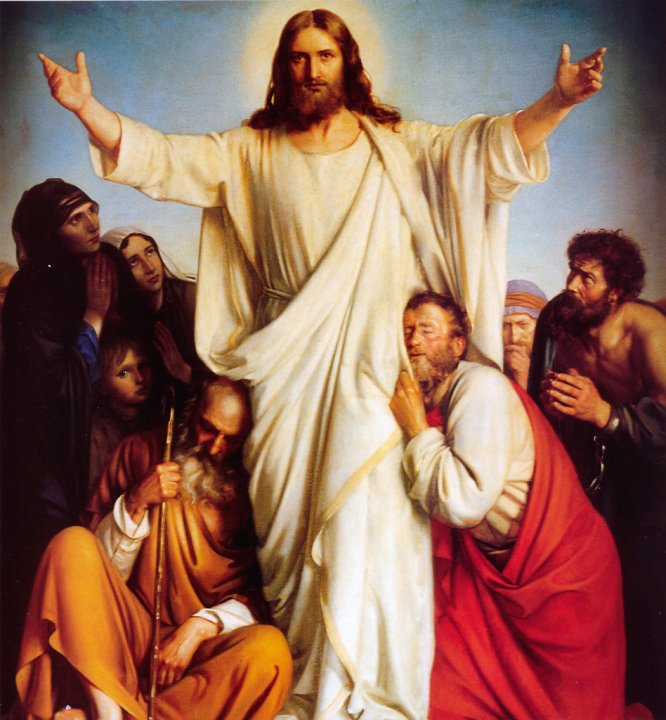3rd SUNDAY OF EASTER-C
I Reading: Acts
5:27-32.40-41: We are witnesses of all this, we and the Holy Spirit. Peter puts
obedience to God before obedience to men.
II Reading:
Apocalypse 5:11-14: The Lamb that was sacrificed is worthy to be given riches
and power.
Gospel: John
21:1-19: Jesus stepped forward, took the bread and gave it to them, and the same
with the fish.
The Great reality
of Jesus’ Resurrection Body, Jn 21:1-14
Jesus proved the great
reality of His resurrection body. He showed that He really did arise from the
dead. Death has been conquered and people could now live forever.
1. Jesus appeared again
(v.1-3)
a. Afterward-after these
things: proof of the resurrection, 20:1-31
b. To seven disciples who
were together: hiding for fear of the authorities
c. Peter went fishing: To
meet the need for food
d. A needed lesson: Self-sufficiency
is inadequate-must know and depending upon the risen Lord
2. Jesus stood on the shore
bodily (v.4)
a. An immediate presence
b. A bodily presence
3. Jesus possessed
supernatural knowledge (v.5-8)
a. He acted on his
supernatural knowledge
b. He was identified: “The
Lord”
c. Peter accepted John’s word
as proof and he responded
d. The other disciple (John)
responded and followed
4. Jesus showed the reality
of their surroundings (v.9)
a. The land and fire
b. The fish and bread
5. Jesus showed that he could
see, speak, hear and feel (v.10-11)
a. He instructed the
disciples
b. Peter obeyed
c. The catch of fish was
counted
6. Jesus showed that his body
was real (v.12-13)
a. He invited them to eat
b. He was the Lord
c. He himself ate
7. Conclusion: Jesus’
resurrection was affirmed
The Great Question
of Disciple’s Love and Devotion, Jn 21:15-17
This is a critical passage
for the church and its ministers. It has one great lesson: love is the one
basic essential for ministry. Without love, ministry counts for nothing in
God’s eyes. This passage concerns three questions asked by our Lord.
1. After the meal, Jesus focused
on Peter (v.15)
2. Do you love me more than
these? (v.15)
a. Pointed to disciples
b. Pointed to fishing
equipment
c. Feed my lambs
3. Do you love me with God’s
love-love me enough to feed my people? (v.16)
a. God’s love
(agape)=sacrificial love of God
b. Peter’s love
(phileo)=blood relationship or relative love of Peter, (erotic love)=emotional
or feelings or attractions love of people
c. Feed my sheep/tend my
sheep
4. Do you love me as a royal
brother-love me with agape love or phileo love? (v.17)
a. Lord’s love
(agape)=sacrificial love
b. Peter’s love
(phileo)=relational love
c. Feed my sheep
thought: Agape love is a seed that can be planted in the
heart only by Christ. It is a fruit of the Spirit of God. It is a great love
that God holds for His Son (Jn 15:10; 17:26). Agape love was perfectly
expressed when God gave up His own Son to die for humanity (2Cor 5:14;Eph
2:4;3:19;5:2).
Agape love holds believers together as Jesus
held his disciples for three years. Agape love is the love believers are to
have for one another (Jn 13:33-35; 1 Jn 3:17-18). Agape love is the love which
believers are to have for all people (1Cor 16:14; 1Th 3:12; 2Pet 1:7). Thus
agape love seeks the welfare of all, works no ill to its neighbour, seeks
opportunities to do good to all especially to those of the household of faith
and is proven by obedience to Christ. Doing as one wishes instead of doing as
God wills shows that one does not have agape love. (Jn 14:15,21,23;15:10;1Jn
2:5;5:3; 2Jn 1:6)
Thought: The greatest of all tragedies
is that some still do not accept and believe the Lord’s death and resurrection
despite the irrefutable evidence.
